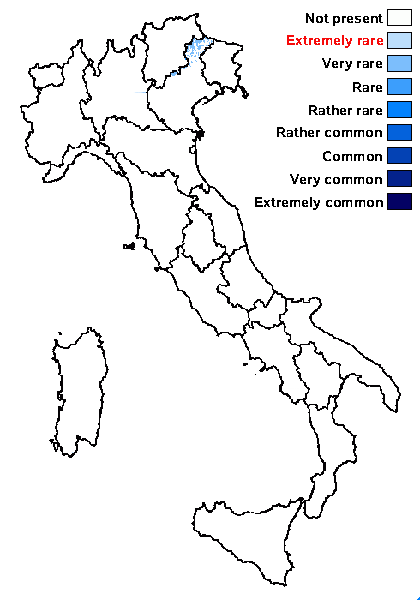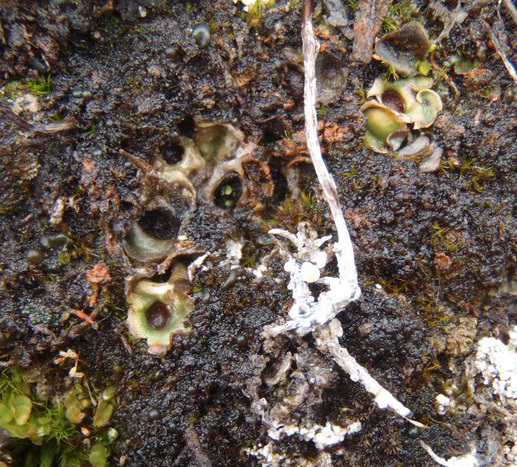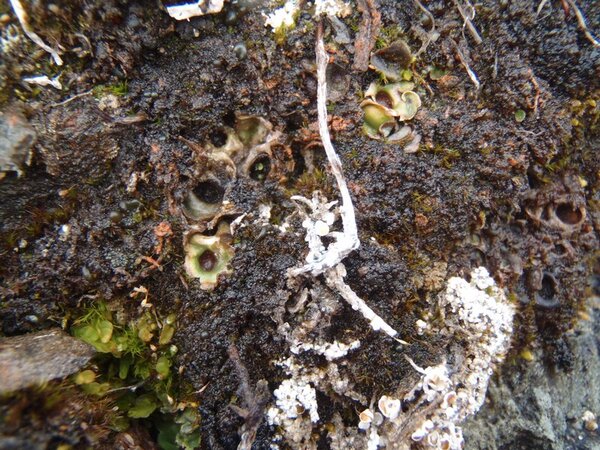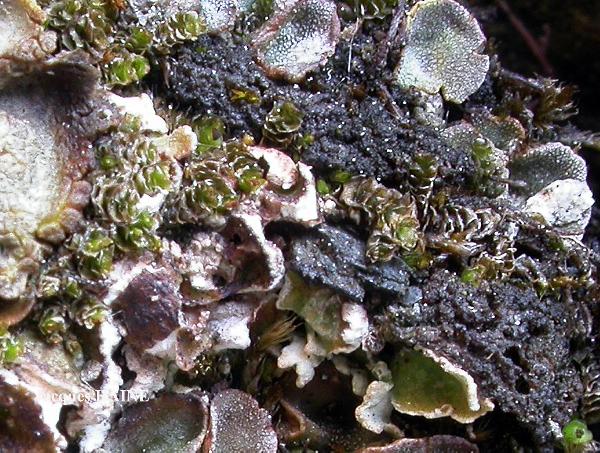Solorina bispora var. subspongiosa (Zschacke) Frey
Ergebn. wiss. Unters. schweiz. Natn. Parks, N.S., 3, 27: 378, 1952.. Basionym: Solorina bispora f. subspongiosa Zschacke - Die Flechten des Davoser Tales (Separat) Buchdruckerei Davos A. G.: 26, 1926.
Synonyms:
Distribution: N - Ven (Nascimbene & al. 2021).
Description: Thallus subcrustose, poorly developed, sometimes evident as a thin, continuous or lacerate, 0.5-1 mm wide collar around the apothecia, sitting on a dark layer of coralloid to nodulose external cephalodia containing Nostoc, which become subgelatinous when wet. Apothecia frequent, semi-immersed, 2-5 mm across, with a brown to brown-black, concave disc, without a thalline margin. Proper exciple poorly developed; epithecium brownish; hymenium and hypothecium colourless; paraphyses coherent, not anastomosing, simple, not apically thickened. Asci 2-spored, clavate, fissitunicate, the apex of the endoascus with a K/I+ blue ring-shaped structure, Peltigera-type. Ascospores 1-septate, constricted at septum, dark brown, ellipsoid to broadly fusiform, 60-105 x 25-55 μm, with a thick, ornamented wall. Photobiont chlorococcoid (Coccomyxa) in the green parts of thallus, but mostly Nostoc in the cephalodia forming most of the visible thallus. Spot tests: K-, C-, KC-, P-, UV-. Chemistry: without lichen substances. Note: this is the morph with a dominant cyanobacterial photobiont in the S. bispora-group; on basic to subneutral soil at high elevations; not always distinguished, and probably more widespread in the Alps.
Growth form: Foliose
Substrata: soil, terricolous mosses, and plant debris
Photobiont: green algae other than Trentepohlia (primary); cyanobacteria, filamentous (e.g. Nostoc, Scytonema) (secundary, e.g. in cephalodia)
Reproductive strategy: mainly sexual
Commonnes-rarity: (info)
Alpine belt: very rare
Subalpine belt: very rare
Oromediterranean belt: absent
Montane belt: absent
Submediterranean belt: absent
Padanian area: absent
Humid submediterranean belt: absent
Humid mediterranean belt: absent
Dry mediterranean belt: absent

Predictive model
Growth form: Foliose
Substrata: soil, terricolous mosses, and plant debris
Photobiont: green algae other than Trentepohlia (primary); cyanobacteria, filamentous (e.g. Nostoc, Scytonema) (secundary, e.g. in cephalodia)
Reproductive strategy: mainly sexual
Commonnes-rarity: (info)
Alpine belt: very rare
Subalpine belt: very rare
Oromediterranean belt: absent
Montane belt: absent
Submediterranean belt: absent
Padanian area: absent
Humid submediterranean belt: absent
Humid mediterranean belt: absent
Dry mediterranean belt: absent

Predictive model
 DOLICHENS
DOLICHENS





